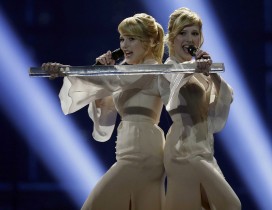5 things about German leader's visit to Washington
German Chancellor Angela Merkel gestures during her speech at the Munich Security Conference on Feb. 7.
(Photo: Matthias Schrader, AP)
German Chancellor Angela Merkel arrived in Washington late Sunday, February 8, for meetings with President Obama that start Monday. Here's what they will talk about:
UKRAINE
"One of the most pressing issues is the crisis in Ukraine," said Peter Wittig, Germany's ambassador to Washington. "All of us are concerned this is a spiraling military conflict. We want to explore the diplomatic options."
Merkel's visit comes as Obama considers providing modern weapons to Ukraine, which has been losing territory in the country's eastern regions to pro-Russian separatists armed with tanks and personnel carriers sporting Russia's most advanced armor.
Ukrainian President Petro Poroshenko on Saturday asked Western leaders at the Munich Security Conference to push for a quick cease-fire and defensive weapons capable of countering the separatists' armored assaults.
Merkel, French President Francois Hollande and Russian President Vladimir Putin agreed Friday during a meeting in Moscow to draft a peace plan for Ukraine based on ideas proposed by Putin and Poroshenko, but previous agreements have fallen apart even as the conflict has resulted in more than 5,300 dead in Ukraine.
Merkel has opposed sending weapons to Ukraine. On Saturday, she said she "cannot imagine any situation in which improved equipment for the Ukrainian army leads to President Putin being so impressed that he believes he will lose militarily," according to the Associated Press.
Wittig, who briefed reporters in Washington in advance of Merkel's visit, said that if the West delivered weapons to Ukraine, "Moscow would probably reciprocate" by providing separatists with more weapons.
"How far are we willing to escalate that military spiral? I'm not sure that we are," Wittig said.
IRAN
Merkel will also discuss Iranian nuclear negotiations with Obama. The talks face a March 24 deadline imposed by U.S. Senator Bob Menendez, D-N.J., who sent Obama a letter saying he is among at least 10 Democrats who will agree with their Republican colleagues to impose new economic sanctions on Iran if there is no framework agreement over the country's disputed nuclear program by that date. Obama has threatened to veto such a bill.
The deadline has created a new sense of urgency, but, "We feel we should use the window of opportunity we have to come to an agreement," Wittig said.
Germany, the USA, Britain, France, Russia and China have been negotiating with Iran on limits to its nuclear program in return for the lifting of economic sanctions that have crippled the oil-rich nation's economy. U.S. officials have said they seek to extend the time frame in which Iran could quickly produce enough fissile material for a nuclear weapon from two months to at least a year. Iran denies it seeks nuclear weapons capabilities.
Wittig said any measures Iran may take to satisfy the West would also require an agreement to allow strong monitoring to assure Iran sticks to the deal. And any deal would expire after a time period on which the two sides have yet to agree.
"We're talking about double-digit years until there's complete sanctions relief," Wittig said. "If that's not viable it's not going to work."
ISLAMIC STATE
Obama and Merkel will also discuss a training center Germany is setting up in Erbil, in Kurdish-controlled Iraq, to train and provide arms to Kurdish Peshmerga forces fighting against the Islamic State, which has seized territory in Iraq and Syria.
Merkel will also discuss German interest in pursuing other tracks of destabilizing the militant group, including counter-financing and supporting messages that de-legitimize the group's claims that its actions, including the murder by fire last month of a captured Jordanian pilot, are backed by Muslim religious ideals.
AFGHANISTAN
Merkel will talk to Obama about Afghanistan and Obama's pledge to pull out U.S. troops by 2016, Wittig said.
Obama has declared the U.S. combat role in Afghanistan to be over, but many observers of the conflict there doubt the Afghan military's ability to stand on its own against a Taliban insurgency that has raged since the USA ousted the group from power following the terrorist attacks of Sept. 11, 2001.
"We think it's wise to have a pullout accord tied to achievements and bench marks," Wittig said.
TRADE
Finally, the two leaders will discuss a thorny trade pact, the Transatlantic Trade and Investment Partnership, which would unite the economies of the USA and the 28 nations of the European Union. The deal would eliminate most trade barriers for many products and financial services.
Backers say it could produce free-market prosperity, but the negotiations have also been controversial because the pact would increase competition. Greece's new leftist ruling party, Syriza, has said it opposes the plan.
Georgios Katrougkalos, a Syriza party member and Greece's deputy minister for administrative reform, said Monday that his party is against a proposed dispute settlement provision that would allow companies to sue governments for lost profits.


